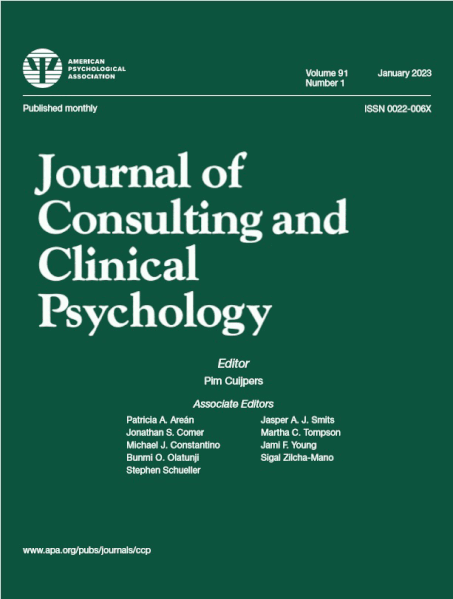Individualized Assessment and Treatment Program (IATP) for alcohol use disorder: Comparison with conventional cognitive-behavioral treatment and examination of coping skills as a mediator of treatment.
IF 5
1区 心理学
Q1 PSYCHOLOGY, CLINICAL
引用次数: 0
Abstract
OBJECTIVE This study tested a highly individualized cognitive-behavioral coping skills treatment for alcohol use disorder (AUD). Recent studies have indicated that coping skills training programs are not always effective. A possible explanation is that the training provided in these programs may not address the specific needs of the patient. The Individualized Assessment and Treatment Program (IATP) was intended to provide a highly individualized approach to the training of skills most relevant for each individual. METHOD Men and women with AUD (N = 173) were randomly assigned to one of three, manualized, 12-session treatments: IATP, a conventional (Packaged) cognitive-behavioral program (PCBT), or a Case Management control condition (CaseM). An experience sampling (ES) procedure was employed prior to, and during, treatment to record alcohol use and coping behaviors in all patients. In IATP, this information was used by therapists to plan treatment that would address the specific strengths and weaknesses of each patient in alcohol-use situations. ES data were collected at multiple time points and patients were followed every 3 months out to 21 months posttreatment. RESULTS Multilevel model analyses indicated that IATP yielded better drinking outcomes than the CaseM or PCBT conditions. Mediation analyses indicated that the effects of IATP versus the other treatments on outcomes were accounted for at least partly by changes in active coping with high-risk situations. CONCLUSION Due to the limited diversity of the sample, generalizability of the results may be limited. Results are discussed in terms of the importance of tailoring treatment for the individual patient. (PsycInfo Database Record (c) 2024 APA, all rights reserved).针对酒精使用障碍的个性化评估和治疗计划(IATP):与传统认知行为治疗的比较,以及将应对技能作为治疗中介的研究。
目的:本研究测试了一种针对酒精使用障碍(AUD)的高度个性化认知行为应对技能治疗方法。最近的研究表明,应对技能训练计划并不总是有效的。一种可能的解释是,这些项目提供的训练可能无法满足患者的具体需求。个性化评估和治疗计划(IATP)旨在提供一种高度个性化的方法,以训练与每个人最相关的技能:IATP、传统(包装)认知行为项目(PCBT)或个案管理对照条件(CaseM)。在治疗前和治疗过程中,采用经验取样(ES)程序记录所有患者的饮酒情况和应对行为。在 IATP 中,治疗师利用这些信息制定治疗计划,以解决每位患者在酒精使用情况下的具体优势和劣势。结果多层次模型分析表明,与 CaseM 或 PCBT 条件相比,IATP 产生了更好的饮酒结果。中介分析表明,IATP 相对于其他治疗方法对结果的影响至少部分是通过积极应对高风险情况的变化来解释的。本文从针对个体患者进行量身定制治疗的重要性角度对研究结果进行了讨论。(PsycInfo Database Record (c) 2024 APA, 版权所有)。
本文章由计算机程序翻译,如有差异,请以英文原文为准。
求助全文
约1分钟内获得全文
求助全文
来源期刊

Journal of consulting and clinical psychology
PSYCHOLOGY, CLINICAL-
CiteScore
9.00
自引率
3.40%
发文量
94
期刊介绍:
The Journal of Consulting and Clinical Psychology® (JCCP) publishes original contributions on the following topics: the development, validity, and use of techniques of diagnosis and treatment of disordered behaviorstudies of a variety of populations that have clinical interest, including but not limited to medical patients, ethnic minorities, persons with serious mental illness, and community samplesstudies that have a cross-cultural or demographic focus and are of interest for treating behavior disordersstudies of personality and of its assessment and development where these have a clear bearing on problems of clinical dysfunction and treatmentstudies of gender, ethnicity, or sexual orientation that have a clear bearing on diagnosis, assessment, and treatmentstudies of psychosocial aspects of health behaviors. Studies that focus on populations that fall anywhere within the lifespan are considered. JCCP welcomes submissions on treatment and prevention in all areas of clinical and clinical–health psychology and especially on topics that appeal to a broad clinical–scientist and practitioner audience. JCCP encourages the submission of theory–based interventions, studies that investigate mechanisms of change, and studies of the effectiveness of treatments in real-world settings. JCCP recommends that authors of clinical trials pre-register their studies with an appropriate clinical trial registry (e.g., ClinicalTrials.gov, ClinicalTrialsRegister.eu) though both registered and unregistered trials will continue to be considered at this time.
 求助内容:
求助内容: 应助结果提醒方式:
应助结果提醒方式:


